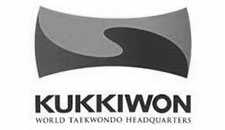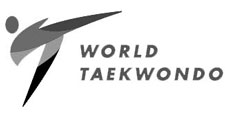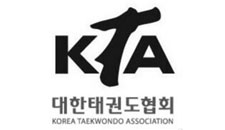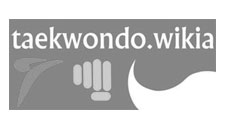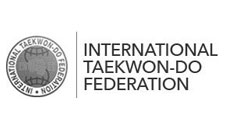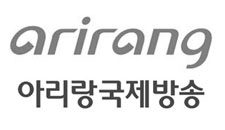Taekwondo 태권도Taekwondo Preschool
Joseon was a Korean state founded by Taejo Yi Seong-gye that lasted for approximately five centuries, from July 1392 to October 1897. It was founded following the aftermath of the overthrow of the Goryeo Dynasty in what is today the city of Kaesong. Early on, Korea was retitled and the capital was relocated to modern-day Seoul. View Joseon Era 조선 »
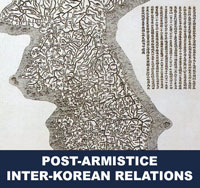
Post-Armistice Inter-Korean Relations
The division of Korea into South Korea and North Korea was the result of the 1945 Allied victory in World War II, ending the Empire of Japan's 35-year colonial rule of Korea by General Order No. 1.

Although the truce seemingly ended the war between North and South Korea, it is often regarded as a truce in name only. This proved to be especially true after the attack of ROKS Cheonan sinking, the world has their eyes on North Korea's next move, and two Koreas' tension has flared since then. The incident chilled inter-Korean relations and seemed to freeze all exchanges between the two Koreas. As soon as the investigation team revealed that the Cheonan was sunk by North Korea, President Lee implemented countermeasures called the May 24 Measures. The South Korean government suspended all inter-Korean exchanges and cooperation with the North, except for business operations in the Kaeseong Industrial Complex and the pure humanitarian aid for the underprivileged people in North Korea.
The Korean peninsula, in the end, became a continuous battlefield without an official declaration of peace. With the South Korean conscription act and North Korea maintaining the largest standing army, it is very obvious that the threat of war remains in the air between North and South Korean politics. With the armistice, there was no official statement of which political ideology was right. As a result, both countries were determined to keep their ideology going strong. For example, the North Koreans saw themselves as the "true" Koreans and would refuse unification unless a Communist regime was accepted.
There is a great deal of skepticism towards North-South Korea relations. Economically, it is commonly alleged that the South provides a great deal of support to the North whilst receiving nothing in return. However, compared to the previous South Korean government or the former West German aid to East Germany, the Kim Dae Jung administration's assistance to North Korea has been rather minuscule. The aid to North Korea in the year 2000 was only .017 percent of South Korea's GDP, less than one-fourth of the former West Germany's annual aid to East Germany. While it may seem low, it must be remembered that during the year 2000, much of the South Korean government had considered the Sunshine Policy as dead.
Beginning in 1998, the South Korean president Kim Dae-jung has made efforts to reunify the Korean peninsula by creating the Sunshine Policy. This policy was meant to ease tensions between South Korea and North Korea after so many years after the Korean War. It initially was meant so that instead of treating North Korea like a caged animal, South Korea and North Korea would work together and discuss any issues within the peninsula. However, the South Korean government has recently stated that the nuclear arms program in North Korea has killed the Sunshine Policy. As such, the South Korean government no longer desires cooperation with North Korea since North Korea refused to meet all its demands.
On July 7, 1988, with the announcement of the Presidential Declaration for National Self-esteem Unification and Prosperity, South and North Korea officially promoted inter-Korean exchanges and cooperation. These exchanges halted temporarily when North Korea withdrew from the NPT in March 1993, but it eventually resumed its course and remains in effect to the present day. Up until 1989, only one person crossed the border but that number has increased over the years and now stands at 130,000. Inter-Korean trade recorded 19 million US dollars in 1989 but it reached 1.9 billion US dollars in 2010. Additionally, the total amount of humanitarian aid from 1995 to late 2010 equals approximately 2.9 billion US dollars.
The foreign relations that define the place of North and South Korea in the world community today are product of the trajectories. Starting with 1945 nation building process of South Korea led by US, South has been allied with United States whereas North Korea has allied with China and Russia. However with the increasing prosperity of China and its power in the international society, North Korea has limited power in China.
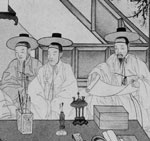
Korea ( 한국 )
Korea ( 한국 ) called Hanguk in South Korea and Chosŏn in North Korea, is an East Asian territory that is divided into two distinct sovereign states, North Korea and South Korea. Located on the Korean Peninsula, Korea is bordered by China to the northwest and Russia to the northeast. It is separated from Japan to the east by the Korea Strait and the Sea of Japan (East Sea). For more information View Korea ( 한국 ) »
RESOURCES
This article uses material from the Wikipedia article "Korean War", which is released under the Creative Commons Attribution-Share-Alike License 3.0.



